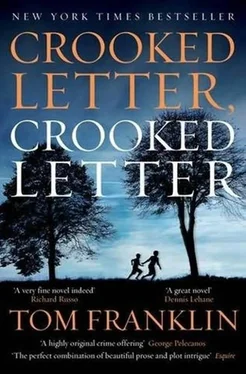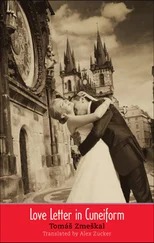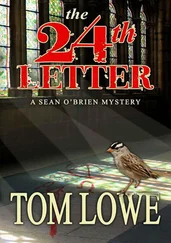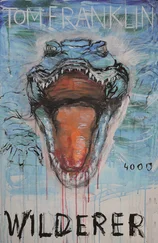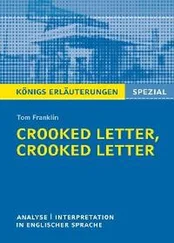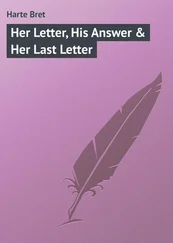Silas got out and his sunglasses fogged. He took them off and hung them in his collar and stretched and smelled the hot after-rain and listened to the shrieking blue jays, alone at the edge of a wall of woods, miles from anywhere. If he wanted, he could fire his.45 and nothing or nobody in the world would hear other than some deer or raccoons. Least of all Tina Rutherford, the nineteen-year-old college student, white girl, he was both hoping and hoping not to find under the cloud of buzzards. Daughter of the mill owner, she’d left home at the end of summer, headed back north to Oxford, to Ole Miss, where she was a junior. Two days had passed before her mother, worried, had phoned. When her roommates confirmed that she’d never arrived, a missing persons report had gone out. Now every cop in the state was looking, especially those around here: forget everything else and find this girl.
Silas searched through a wad of keys for the one with a green tag and let himself in the gate and drove through and parked on the other side and closed the gate and locked it behind him.
Back in the Jeep, he cranked down his window and floated through identical pine trees, tall wet bitterweed in the middle of the road wiping the hood like brushes at a carwash. Where the land slanted down the trees had angled their trunks gracefully like arms bent at the elbow. He bumped and slid along half hoping he’d get stuck. Since much of his work in his rural jurisdiction involved dirt roads, he kept requisitioning the Chabot town council for a new Bronco. Kept not getting it, too, stuck with this clunker that, in a past life, had been a mail truck-you could still see a faint US POSTAL on its little tailgate.
His radio crackled. “You coming, 32?”
Voncille. If Silas was the Chabot police force, she was City Hall.
“Can’t, Miss Voncille,” he said. “Got something I want to check out here.”
She sighed. If he wasn’t there to do it, she’d have to put on the orange vest and direct traffic at the mill entrance for the early shift change.
“You owe me,” she said. “I just got my hair done.”
He rogered and hung the radio on his belt and shook his head at what he was about to do to his good leather boots.
He slowed to five miles an hour. When the road ended at the bottom of the hill he braked but kept moving, his own private mud slide. The Jeep turned by itself and he turned with it and soon had it stopped. He took his cowboy hat off the seat beside him and got out and pushed his door to and passed into the trees and descended the hill, digging his heels in the wet carpet of leaves, slipping once and grabbing a vine, which rained a pail’s worth of water on him. Prettier land down here and, too steep to clear-cut, trees other than pines. The trunks were darker in the rain, some shelved with rows of mushroom or layered in moss. The air grew cooler the lower he went and at the bottom he brushed at his shoulders and emptied his hat, the hill tropic behind him, its odor of rain and worms, dripping trees, the air charged as if lightning had just struck, squirrels flinging themselves through patches of sky and the snare-roll of a woodpecker a few hollows over, the cry of an Indian hen.
He picked his way along the water’s edge, setting off a series of bullfrogs from the cattails and reeds. Cane Creek was more like a slough, he thought. It hardly moved at all, its blackberry water stirred only by the wakes of frogs or bubbles from the bottom or the bloops fish made. Among floating leaves and dark black sticks, liquor bottles and their reflections and faded beer cans and theirs had collected in coves and turns, and he wondered who the hell would come all the way out here to litter. He fanned his face again, insects like toy planes propellering madly through the high branches. Might just be a bobcat, he thought. Come down to the creek to die. That old instinct: hurt, head for water.
He thought of his mother, dead eight years. The time the two of them lived in a hunting cabin on land owned by a white man. No water in the place, no electricity, no gas. They’d been squatters there for less than a week when a one-eared tomcat appeared on the porch just past dark, scrotum big as a walnut. They shooed it off but morning found it lying at the steps with a twitching mouse in its jaws. My Lord, his mother said, that cat’s applying for a job. They hired it and it insinuated itself all the way onto his mother’s bed, where she said it warmed her feet. They moved from that cabin a few months later and the cat moved with them. It would live with them for years, but then, just before he left to go to Oxford his senior year, the cat disappeared. By the time he noticed, his mother said it had been gone nearly a month.
“Where?”
“Just off, baby,” she said.
“Off?”
She was washing clothes in the sink, still in her hairnet from work. “To die, Silas,” she’d said. “When an animal’s time come, it goes off to die.”
The underbrush thinned as he went, the air hotter, muggier, and suddenly the trees had thrown open their arms to a high white sky, a burst of glowing logs and schools of steaming toadstools and clouds of gnats, wet leaves sparkling like mirrors and a spiderweb’s glowing wires. A mosquito whined past his ear and he slapped at his arms and neck, going faster, leaves plastered to his boots, aware of a sharpness to the air, now a sweet rot.
Something fifty yards ahead began to lurch toward him. He stopped and thumbed the quick-release of his sidearm as other things moved as well, the earth floor stirring to life. But the thing veered away flapping into the air, just a buzzard, feet hanging, and then others were winging their duffle bodies over the water or waddling up the bank.
The odor grew worse as he stepped closer to where the land gave over to swamp. Farther down more of the birds lined the bank like crows on steroids, unfeathered necks and heads and some with faces red and tumored as a rooster’s, some stepping from one scaled claw to the other and some with their beaks open.
He hoped not to have to shoot any as he mushed along fanning the air with his hand. Here he was two years as Chabot’s law and he’d never fired his pistol except at targets. Practice. Never for real. Not even a turtle on a log.
Another of the ungainly birds heaved itself from the bank and kicked the swamp face, breaking its own image, and flapped up to the knuckled low branch it stood clasping and unclasping with its feet. He remembered somebody, Larry Ott, telling him that once a flock of buzzards took to roosting in a tree, the tree began to die. He could smell why. He took a ripe breath and went on as the limbs closed in again. He ducked a low vine, wary of snakes. Cottonmouth-moccasins, his mother used to call them. Mean ole things, she’d say. Big and shiny as a black man’s arm, and a mouth as white as the cotton he pick.
Silas took off his hat. In the distance, three or four lumps in rags of plaid clothing, lodged in the water among a vista of cypress trees and knees and buzzards black and parliamentary and all the flies a world could need. A large shadow passed him and he looked overhead where more buzzards circled yet, some at near altitudes not colliding but seeming to pass through one another, their wings and tail feathers sun-silvered at the tips. His mouth was dry.
These early birds had been at work awhile, and the heat hadn’t helped. From this far off, and at this level of decomposition, an ID should have been impossible. But Silas shook his head. Keyed his radio.
IT WAS THE PLAID, he’d later tell French.
A few days back Silas had been called out to a secluded area behind a grown-up cotton field off Dump Road. An old Chevy Impala burning. The driver of a passing garbage truck had seen smoke and radioed it in.
Silas knew the car from its charred vanity plates, M &M, Morton Morrisette’s nickname. He’d played second base to Silas’s shortstop in high school. After graduation M &M had worked for a dozen years at the mill until he hurt his back; now he got a small disability and, allegedly, sold weed on the side. Because he was smart and careful, and because he avoided narcotics, he’d never been stung by the police. Watched, yes: French and the county narcotics investigator managed to keep their eyes on nearly every known or suspected dealer in the county, but barring violence or a complaint, or someone flipping on him, they’d had to let him be, and M &M had sold his marijuana to trusted locals both black and white since the early 1990s.
Читать дальше
